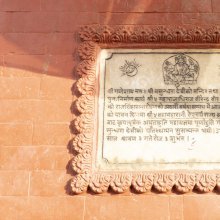Akam, Ākam: 5 definitions
Introduction:
Akam means something in Hinduism, Sanskrit, Hindi, biology, Tamil. If you want to know the exact meaning, history, etymology or English translation of this term then check out the descriptions on this page. Add your comment or reference to a book if you want to contribute to this summary article.
Images (photo gallery)
In Hinduism
Vyakarana (Sanskrit grammar)
Source: Wikisource: A dictionary of Sanskrit grammarĀkam (आकम्).—The substitute आकम् (ākam) for साम् (sām) of the gen. pl. after the words युष्मद् (yuṣmad) and अस्मद् (asmad) e. g. युष्माकं, अस्माकम् (yuṣmākaṃ, asmākam) cf. P.VII.1.33.

Vyakarana (व्याकरण, vyākaraṇa) refers to Sanskrit grammar and represents one of the six additional sciences (vedanga) to be studied along with the Vedas. Vyakarana concerns itself with the rules of Sanskrit grammar and linguistic analysis in order to establish the correct context of words and sentences.
Natyashastra (theatrics and dramaturgy)
Source: Shodhganga: The significance of the mūla-beras (natya)Akam (mind) is explained in the Tāṇḍava-tāla-marapu, the second part of the Niruttamarapu (“literary usage of dance”) which represents the third book of the Pañcamarapu (‘five-fold traditional usage’): an important piece of Tamil literature.—Akam stands for the three mental aspects of sāttvikam (peace), rāsatam (enthusiasm) and tāmatam (meekness) and the nine Rasas (sentiments) of uvakai (joy), nakai (laughter), alukai (pathetic), vekuli (anger), perumitam (sense of pride), accam (fear), ilivaral (fatigue), maruṭkai (surprise), naṭunilai (peace). These nine rasas are exhibited through three characters namely, the sāttvika, rājasa and tāmasa.

Natyashastra (नाट्यशास्त्र, nāṭyaśāstra) refers to both the ancient Indian tradition (shastra) of performing arts, (natya—theatrics, drama, dance, music), as well as the name of a Sanskrit work dealing with these subjects. It also teaches the rules for composing Dramatic plays (nataka), construction and performance of Theater, and Poetic works (kavya).
Biology (plants and animals)
Source: Google Books: CRC World Dictionary (Regional names)Akam in India is the name of a plant defined with Acalypha indica in various botanical sources. This page contains potential references in Ayurveda, modern medicine, and other folk traditions or local practices It has the synonym Ricinocarpus baillonianus Kuntze (among others).
Example references for further research on medicinal uses or toxicity (see latin names for full list):
· European Review for Medical and Pharmacological Sciences (2008)
· Phytochemistry. (2009)
· Fl. Carol. (1788)
· Taiwania (1991)
· Botanische Jahrbücher für Systematik, Pflanzengeschichte und Pflanzengeographie (1894)
· Pakistan Journal of Pharmaceutical Sciences (2010)
If you are looking for specific details regarding Akam, for example side effects, health benefits, extract dosage, diet and recipes, chemical composition, pregnancy safety, have a look at these references.

This sections includes definitions from the five kingdoms of living things: Animals, Plants, Fungi, Protists and Monera. It will include both the official binomial nomenclature (scientific names usually in Latin) as well as regional spellings and variants.
Languages of India and abroad
Hindi dictionary
Source: DDSA: A practical Hindi-English dictionaryAkam in Hindi refers in English to:—(a) without a wish, unhaunted by desires; hence ~[ta] (nf)..—akam (अकाम) is alternatively transliterated as Akāma.
...
Tamil dictionary
Source: DDSA: University of Madras: Tamil LexiconAkam (அகம்) noun probably from அல்கு-. [alku-.] [K. āge, M. akam.]
1. Inside; உள்ளிடம். அகம்புற நிறைந்த சோதியாய் [ullidam. agambura niraintha sothiyay] (தாயுமானசுவாமிகள் பாடல் சிவன்செ. [thayumanasuvamigal padal sivanse.] 4).
2. Mind; மனம். அகமலர்ந் தீவார் [manam. agamalarn thivar] (பதினொராந்திருமுறை திருவிடை. மும். [pathinorandirumurai thiruvidai. mum.] 7).
3. Sexual pleasure; காம வின்பம். [kama vinpam.] (தொல். பொ.. [thol. po..] 1, உரை. [urai.])
4. Breast; மார்பு. புல்லக மகன்றது [marpu. pullaga maganrathu] (சிலப்பதிகாரம் அரும்பதவுரை [silappathigaram arumbathavurai] 30, 16).
5. Agricultural tract; மருதம். ஆலைக்கரும்பி னக நா டணைந்தான் [marutham. alaikkarumbi naga na danainthan] (சீவகசிந்தாமணி [sivagasindamani] 1613).
6. House; வீடு. (பிங்கலகண்டு) [vidu. (pingalagandu)]
7. Place; இடம். (திவா.) [idam. (thiva.)]
8. Ether; ஆகாயம். [agayam.] (தைலவருக்கச்சுருக்கம் பாயி.. [thailavarukkachurukkam payi..] 22.)
9. Love-theme; அகப்பொருள். [agapporul.]
10. Being subordinate, subject; உள்ளடங்குகை. அகப்பட்டி [ulladangugai. agappatti] (திருக்குறள் [thirukkural], 1074).
11. An anthology of love-lyrics. See அகநானூறு. அகம்புறமென் றித் திறத்த வெட்டுத் தொகை. [agananuru. agamburamen rith thiratha vettuth thogai.] (தனிப்பாடற்றிரட்டு [thanippadarrirattu]). — particle A locative ending; ஏழாம் வேற்றுமைச் சொல்லுருபு. [ezham verrumais sollurupu.] (நன். [nan.] 302.)
--- OR ---
Akam (அகம்) noun See அஃகம்¹. அகமது குறை விலாதாய் [aqkam¹. agamathu kurai vilathay] (பாரதம் வியாசருற். [paratham viyasarur.] 8).
--- OR ---
Akam (அகம்) noun < aga.
1. Tree; மரம். (பிங்கலகண்டு) [maram. (pingalagandu)]
2. Panicled babul. See வெள்வேல். (வைத்திய மலையகராதி) [velvel. (vaithiya malaiyagarathi)]
3. Mountain; வைத்திய மலையகராதி பொற்பக வினாயகன் [vaithiya malaiyagarathi porpaga vinayagan] (திருவாலவாயுடையார் திருவிளையாடற் காப்பு [thiruvalavayudaiyar thiruvilaiyadar kappu], 2).
4. Earth; பூமி. (பிங்கலகண்டு) [pumi. (pingalagandu)]
--- OR ---
Akam (அகம்) noun < agha.
1. Sin;பாவம். அகமற [pavam. agamara] (இரகுவமிசம் நாட்டு. [iraguvamisam nattu.] 32).
2. Impurity, pollution; ஆசௌசம். அகமற நூற்றெட் டாகுதி [asausam. agamara nurred daguthi] (திருவானைக்காவுலா கோச்செங். [thiruvanaikkavula kocheng.] 79).
--- OR ---
Akam (அகம்) noun < ahaṃ.
1. I, self; நான். வளைப்பகம் வகுத்துக்கொண் டிருந்தேன் [nan. valaippagam vaguthukkon dirunthen] (நாலாயிர திவ்யப்பிரபந்தம் பெரிய.ாழ். [nalayira thivyappirapandam periyazh.] 5, 1, 5).
2. Egotism; அகம்பாவம். அக மறு முணர்வுண் டாயும் [agambavam. aga maru munarvun dayum] (ஞானவர். சுகர். [gnanavar. sugar.] 8).
3. Soul; ஆன்மா. அதுவதுதா னென்னு மகம் [anma. athuvathutha nennu magam] (சிவஞான போதம் [sivagnana potham] 3, 6).
--- OR ---
Ākam (ஆகம்) noun probably from ஆகு-. [agu-.]
1. Body; உடல். [udal.] (நாலாயிர திவ்யப்பிரபந்தம் திருவாய்மொழி [nalayira thivyappirapandam thiruvaymozhi] 9, 3, 7.)
2. Breast; மார்பு. முலையாகம் பிரியாமை [marpu. mulaiyagam piriyamai] (கலித்தொகை [kalithogai] 2).
3. Mind, heart; மனம். ஆகத்தெழுகனல் கண்வழியுக [manam. agathezhuganal kanvazhiyuga] (கம்பராமாயணம் கரன்வ. [kambaramayanam karanva.] 97).
--- OR ---
Akam (அகம்) noun < agha.
1. Personal faults, as attachment, hatred, etc.; இராகம் துவேஷம் முதலிய தோஷம். (நாநார்த்த.) [iragam thuvesham muthaliya thosham. (nagarthathipigai)]
2. That which is bad; evil; தீயது. (பொதிகை நிகண்டு) [thiyathu. (pothigai nigandu)]
--- OR ---
Akam (அகம்) noun cf. அககந்தம். [agakantham.] Sulphur; கந்தகம். (வைத்திய மூலிகை) [kanthagam. (vaithiya muligai)]
--- OR ---
Ākam (ஆகம்) noun Calabash; சுரை. ((சங்கத்தகராதி) தமிழ்சொல்லகராதி) [surai. ((sangathagarathi) thamizhsollagarathi)]
Tamil is an ancient language of India from the Dravidian family spoken by roughly 250 million people mainly in southern India and Sri Lanka.
See also (Relevant definitions)
Starts with (+82): A-kamavinai, Aka-malarcciani, Aka-mukama, Akam-piramavati, Akama, Akamacastiram, Akamaga, Akamahata, Akamaka, Akamakamin, Akamakarshan, Akamakarshana, Akamakaunu, Akamakinu, Akamakka, Akamakka-parnu, Akamalarcci, Akamam, Akamamalaivu, Akamamaram.
Ends with (+1679): A-candra-tarakam, Aatalootakam, Abhisamdhipurvakam, Abhishakam, Abuddhipurvakam, Acakam, Acamantakam, Acamatakam, Acamotakam, Acamtakam, Acandratarakam, Accakam, Accuritakam, Achandratarakam, Aciyacirakam, Aciyanatakam, Acuvattavivakam, Ahakam, Ai-talainakam, Ai-vakaiyakam.
Full-text (+108): Akampu, Valaiyakam, Porulilakkanam, Akamutaiyan, Agam, Vaiyakam, Agama, Ariyakam, Koyyakam, Aagam, Tiyakam, Akamutaiyal, Nirakam, Sam, Akama, Malaiyakam, Orakattal, Vanakam, Kuruvakam, Kallakam.
Relevant text
Search found 15 books and stories containing Akam, Ākam, Agam, Aagam; (plurals include: Akams, Ākams, Agams, Aagams). You can also click to the full overview containing English textual excerpts. Below are direct links for the most relevant articles:
Jainism and Patanjali Yoga (Comparative Study) (by Deepak bagadia)
Part 5.1 - The main Twelve Angas < [Chapter 3 - Jain Philosophy and Practice]
Part 5 - Jain scriptures and Spiritual teachers < [Chapter 3 - Jain Philosophy and Practice]
Part 7 - Patanjali’s Ashtanga Yoga compared to Jainism < [Chapter 4 - A Comparative Study]
Sahitya-kaumudi by Baladeva Vidyabhushana (by Gaurapada Dāsa)
Text 11.15 < [Chapter 11 - Additional Ornaments]
Tiruvaymoli (Thiruvaimozhi): English translation (by S. Satyamurthi Ayyangar)
Pasuram 2.8.1 < [Section 8 - Eighth Tiruvaymoli (Anaivatu Aravu-anaimel)]
Pasuram 4.3.3 < [Section 3 - Third Tiruvaymoli (Kovai Vayal)]
Section 7 - Seventh Tiruvaymoli (Em Kanal Akam) < [Book 9 - Ninth Centum]
Annadatri-carita (study) (by Sarannya V.)
7. Uthiyan Cheralathan in Sangam Literature < [Chapter 2 - Depiction of King Utiyan Ceralatan in History and Literature]
6. Battle of Venni < [Chapter 2 - Depiction of King Utiyan Ceralatan in History and Literature]
6. The Grand Feast or Perumcorru < [Chapter 1 - The Myth of Grand Feast]
Rig Veda (translation and commentary) (by H. H. Wilson)
Rig Veda 8.13.30 < [Sukta 13]
The Tamil Academy: A Myth < [November, 1928]
Reviews < [April 1940]
Environment and Culture < [July-September, 1928]

